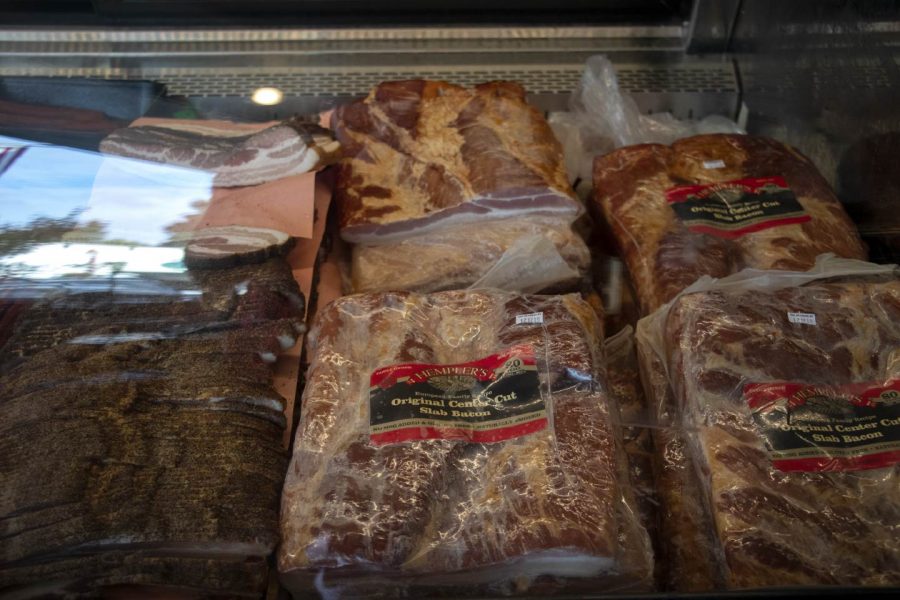New Cultured Meat Alliance Hopes to Push Product to Market
STEP IN THE RIGHT DIRECTION Meat such as these slabs of bacon were produced through the raising and butchering of livestock, but a new alternative is hoping to hit markets soon. Cultured meat, or meat produced outside of an animal from living cells, may be more environmentally friendly than traditional meat production. Cultured meat still has a long way to go before it can hope to replace traditional meat, but companies such as those in AMPS are optimistic that it could one day become a reality.
September 27, 2019
A new meat product based in cellular agriculture has increasingly been making headlines. The product, known as lab-grown meat, in-vitro meat, and most commonly, cultured meat, is currently in development as a possible replacement for the heavily criticized traditional meat industry. Cultured meat is defined as meat grown outside of a living animal by sampling and nurturing animal cells, allowing them to naturally multiply, and harvesting the muscle tissue produced. With increasing concerns relating to growing population, demand for protein, and environmental cost of traditional meat production, cultured meat is seen as a hopeful alternative.
This past August, five companies focused on continuing the development of cultured meat formed a coalition known as the Alliance for Meat, Poultry, & Seafood Innovation (AMPS Innovation). The companies include BlueNalu, Finless Foods, Forke & Good, JUST Inc., and Memphis Meats. In the official press release for AMPS, it states, “All five member companies, and other companies in this new and dynamic industry, are currently in the research and development phase but expect to make products available in the next several years, through appropriate regulatory pathways… AMPS Innovation aims to provide a central, unified resource for consumers, stakeholders and policymakers as their industry advances.” There has been undeniable progress towards the development of cultured meat, but a date when the product will be available remains unclear.
One member company, JUST Inc., promised their cultured meat product to be in markets by the end of 2018, a goal that was missed and continues to be unfulfilled. Other leaders in the industry expressed concern over this premature release, such as Eric Schultz of Memphis Meats was quoted at the 2019 “Industrializing Cell Based Meats” conference saying, “We’ve seen from other areas in the food industry how subpar early products can stigmatize an entire category for decades…or botched regulatory strategies can result in years or even decades-long delays,… what one company does or says will affect us all.”
There are significant technical obstacles facing AMPS if they want to find a clear pathway to market for their product. A 2018 article in the scientific journal “Trends in Food Science & Technology” highlights how a process that can produce cultured meat at an industrial scale, keeping in mind cost and environmental impact, is challenged by technicalities such as the need for industrial size bioreactors. That same article explains the challenges of reproducing natural muscle, due to the complex blood vessel networks and numerous cell types that make up meat as we know it. Despite these challenges, cultured meat continues to attract support and public attention.
In January 2018 Tyson Foods, a giant in the meat industry, invested in Memphis Meats. CEO of Tyson Foods, Tom Hayes, released a statement explaining the importance of innovation in the meat industry as global demand for protein grows. And in May 2019, the FDA released a formal statement outlining their involvement and regulation of cultured meat. When the product eventually does hit markets, public response is anticipated to be mixed. On one hand, the emphasis on natural products does not bode well for literal lab-grown meat. But on the other hand, increasing concern for the environment and a push for innovation, especially by young people, may welcome cultured meat as a replacement for traditional meat.
Senior Ellie Sytsma referred to this as the “breaking free” culture of this generation, with a tendency to gravitate towards new and different products. Junior Atticus Slosson expressed enthusiasm at the idea of trying cultured meat, saying “It’s probably cheaper to make, it’s significantly better for the environment, so I’d be all for it.” What both students have in common, however, is their love of meat. When asked if she would ever consider vegetarianism, Sytsma affectionately referenced the joy of “a good burger or a good steak.” Although both would be happy to try cultured meat and even replace traditional meat with the product, their terms were clear and simple: cost and taste. “If there is a substitute that was just as good, then yeah I’d be all for it. But there just kinda isn’t,” explained Slosson. And if the product was significantly more expensive than traditional meat, it would be a no-go. “The biggest factor is the cost,” said Systma.
Clearly, cultured meat has a ways to go before it will be in grocery store aisles, and possibly even longer to go before it will be filling up people’s carts. But the potential the product holds continues to attract consumers, scientists, and entrepreneurs alike. The world is watching cultured meat, and for now, that is all we can do.



